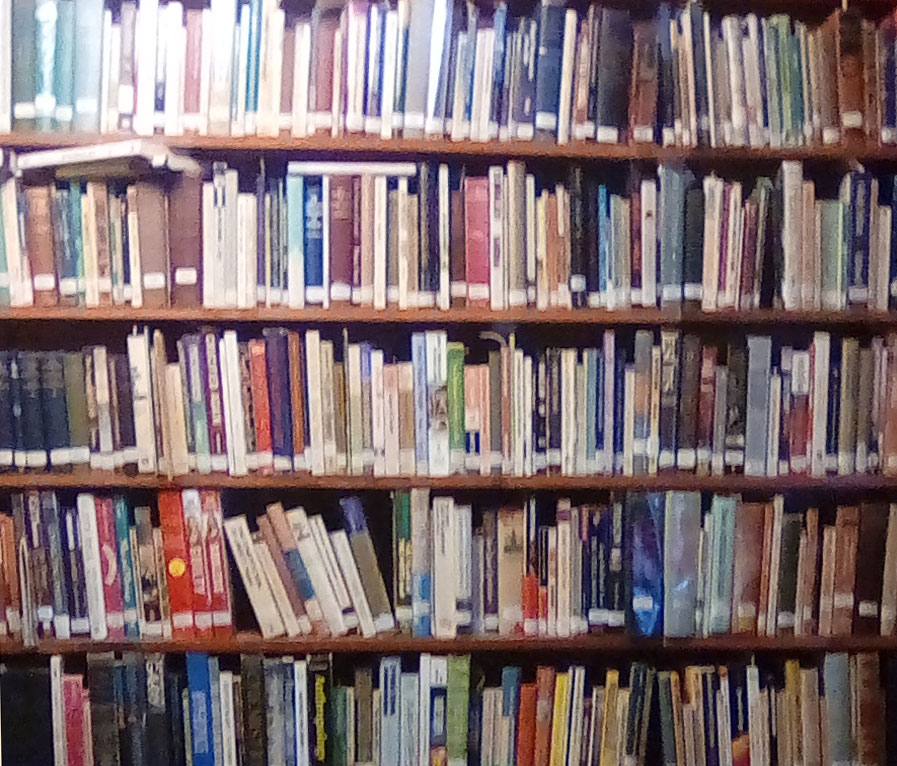The price of knowledge
“When I get a little money I buy books; and if any is left, I buy food and clothes.”—Erasmus (in Peter’s Quotations)

by Dan Graves
In the winter of 1974, I had to withdraw from college, so weak I could barely stand. For about a year I was able to do little more than read and listen to classical music on a borrowed radio.
Thirsty for knowledge, I had been pushing myself to the limit and beyond, working thirty or more hours a week to pay the rent and buy a few groceries for my wife and son, while taking a full class load.
Many days all we had to eat were apples and popcorn, two of the cheapest items in the grocery store. If ever we had a little extra money, I would take a precious dollar to the Goodwill thrift store and fill a sack with ten books for a $1 (worth about $4 today). After my days of work and school, I would read until 2:00 in the morning—books like The Brothers Karamazov and Plato’s Dialogues.

One of my bookcases.
When I won $15 for best essay, spendable at the bookstore (worth about $75 today), I was like a kid in a candy shop vacillating between one book and another. The store sold the usual extras, such as pens, paper, cards, and candy bars. But much as I drooled at the sight of the candy, it was on precious books I spent the prize money. I wanted to know everything there was to know.
But my dream was impossible. Inadequate food and sleep caught up with me. I collapsed and had to leave school. To keep up with my credits, I studied for CLEP tests (college level examination program) while I lay in bed.
When I stumbled across the Erasmus saying that is the theme of today’s blog, I could relate. “When I get a little money I buy books; and if any is left, I buy food and clothes.”
Thanks to the development of the printing press, books were coming down in price during Erasmus’s years (c. 1466–1536), but he was preparing scholarly versions of hitherto unprinted manuscripts for the press, and that was not an inexpensive task. He had to correspond with scholars across Europe, visit libraries, and pay for hand-copying. It’s a cinch he wasn’t picking up ten books for four bucks. In fifteenth-century England, one could still rent a cottage for a year for six shillings—the price of a moderately-priced book. In fact, his work was so expensive he had to beg large sums from patrons all over Europe. He remarked that it cost him and his co-workers more in time and money to restore the works of Jerome than it cost the saint to write them.
Reading the life of Erasmus, one finds a man devoted to learning and willing to risk more than money for it. His preface to his 1516 Greek-Latin New Testament showed concern that he might get into hot water for differing with the Vulgate, the official Latin version of the Catholic Church. He wrote soothingly to Pope Leo X and defended his corrections with citations from early church fathers.
I had been willing to pay a price, too, but never came near Erasmus’s depth of knowledge or his ability to purvey what he had learned. Erasmus was one of the most learned men of his day and by his witty satires on the foibles of his era and his Bible scholarship became a precursor of the Reformation. Following in his steps, many of the great reformers were also profound scholars.
Dan Graves does layout for Christian History magazine and is the webmaster of www.christianhistoryinstitute.org. Sign up for his popular series It Happened Today (a story each day from Christian history).
(Join us each Thursday for a fresh look at a quote from the Reformation era! Sign up via our e-newsletter (in the box at the right) or through our RSS feed (above), or follow us on Facebook through October as we celebrate 500 years of Reformation.)
If your dad likes to read as much as Dan does, check out the book section in our store front in time for Father’s Day ten days from now!



